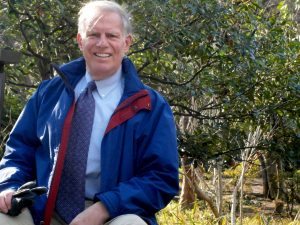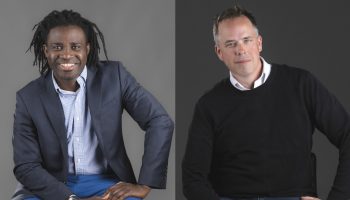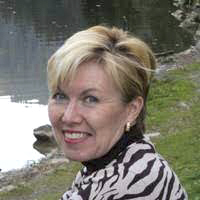Who better to give a tax talk than a featured guest on an episode of NPR’s weekly comedy show, “Wait Wait … Don’t Tell Me!”?
“I’ve put in every joke I know about taxes,” T.R. Reid said.
Returning to Chautauqua to speak at 2 p.m. Saturday, Aug. 4, in the Hall of Philosophy as part of the Chautauqua Women’s Club’s Contemporary Issues Forum, Reid will give a talk titled, “A Fine Mess: Making Taxes Make Sense.” It is based on his 2017 book, A Fine Mess: A Global Quest For a Simpler, Fairer, and More Efficient Tax System.
In addition to having written another nine books in English and three in Japanese, the former Washington Post journalist, foreign correspondent and chief of the Tokyo, London, and Rocky Mountain bureaus, is also a documentary film reporter, long-time NPR commentator and lapsed lawyer.
Since retiring from the Post, Reid has traveled the world to assess how other countries have dealt with important and urgent public policy problems. His “comparative policy analysis” approach — investigating “best practices” among the world’s advanced free-market industrialized democracies — is filling a void.
“It can be hard in America to compare our systems to others because of American exceptionalism.” Reid said. “We’re the best.”
Although people don’t think so, Reid said that the United States has a lot in common with other countries. Pizza, reality TV and Santa Claus are just a
few examples.
A Fine Mess is the second of Reid’s books to date about global best practices. He said that The Healing of America: A Global Quest for Better, Cheaper, and Fairer Health Care, a New York Times best-seller, came out during the debate about Obamacare.
In his review of The Healing of America, demographer and journalist Phillip Longman wrote that “T.R. Reid has done a service to his nation by showing in his latest book just how uninformed this conventional wisdom (about health care) is.”
At that time, Reid said, “the majority of Americans said we have the best (health care) in the world. Now, fewer than a quarter would say so. (The Healing of America) is still selling well.”
As Reid analyzed the health care systems of Germany, Japan, Switzerland, Taiwan and the United Kingdom, a crew from PBS “Frontline” followed him. His experiences are documented in the film “Sick Around the World.”
Along the way, he also did some reporting for NPR, including, “Japanese Pay Less for More Health Care” and “Taiwan Takes Fast Track to Universal Health Care.”
“Frontline/World” had previously produced a film, “India: A Second Opinion,” about Reid’s experience having his “bum shoulder” treated successfully at an Ayurvedic clinic in Tamil Nadu.
When his publisher said, “Let’s catch the next wave — taxes — because of all the rich countries, the U.S. has the least fair and simple tax system,” Reid agreed.
“So my book, A Fine Mess, is the same basic idea,” he said.
In it, Reid said he points out where the United States’ tax system is not doing well, including where the tax code is complicated, inefficient and unfair.
“The average American spends at least 12 to 20 hours and $230 doing taxes,” Reid said. “It takes 10 minutes in other countries. In Britain, three minutes is the average time. There’s no shoebox of receipts and bills to dig through on a nice weekend in April. … You never see an H&R Block.”
See reid, Page A4
The IRS was “very helpful” when Reid called.
“I asked about an instruction that was so complicated, it was funny,” he said. “The woman said, ‘But there are so many of them.’ I put five in the book. We have a problem here. We have not done this well.”
According to Reid, any idea that the right, left, or center of the political aisle has come up with to fix the United States tax system — including zero corporate income tax, Sen. Bernie Sanders’ proposed reforms, the Wall Street speculation tax and the flat tax — has been tried elsewhere.
Regarding the Tax Cuts and Jobs Act, which President Trump signed into law on Dec. 22, 2017, Reid said that it can be assessed according to his comparative measure. During his talk on Saturday, he will answer the question, “How does it stack up?”
Reid began doing multinational comparative policy analysis when he wrote his book The United States of Europe: The New Superpower and the End of American Supremacy.
The Chautauqua Literary and Scientific Circle selected it for inclusion in its booklist, and in June 2005, Reid spoke in the Hall of Philosophy and led the CLSC Roundtable discussion about it.
At the turn of the century — when 12 European countries were giving up their individual currencies, adopting the euro and forming a monetary union — Reid became The Washington Post’s London bureau chief.
He said that as Tokyo bureau chief, he had a theory that Japan and Britain are the same country — “like island twins separated at birth.”
“They both have very expensive figurehead monarchies, but everyone likes them,” Reid said. “In each, there’s a strict class structure, and everybody’s voice changes as they move up in class. They also like lukewarm tea. Both countries have a ‘special relationship’ with the United States.”
For the British, he said, “the (English) Channel is as wide as the Atlantic.”
“Japan’s staple food is rice, they use Chinese characters, it’s a totally Asian country, but they want to feel close to the U.S,” he said.
According to Reid, his editor liked this theory and sent him to London to see if it was true.
Reid credits former British Prime Minister Tony Blair wiith convincing him to take the European Union seriously. Reid said Blair reminded him that there was a time prior to American independence when there were 13 colonies, and by compared that period to what Europe was in the process of doing.
“Great Britain was about to host an annual summit meeting of the European Union, and Tony Blair wanted to summon the big press,” Reid said. “So I went to all the meetings and covered the EU. In January 2002, the coming of the euro was a big deal. There were lots of predictions of chaos. It worked within a week beautifully.”
Deciding that he “wanted to write about what those countries do well and what (the United States) should replicate, and what they don’t do well and we shouldn’t do,” Reid embarked on his comparative policy analysis of Europe.
Throughout his career, Reid has written books that include The Chip: How Two Americans Invented the Microchip and Launched a Revolution, Ski Japan! (hailed as “the definitive English guide to Japan’s great ski resorts”), Reimagining Japan (essays about Japan’s role in the world) and Confucius Lives Next Door: What Living in the East Teaches Us About Living in the West.
As Reid’s career progressed, it became clear that having majored in the classics at Princeton University was useful.
“I was pretty good at Latin and Greek,” he said. “The classics are good preparation for law, journalism and any writing field.”
Reid said Latin and Greek are rigorous, the grammar is carefully thought out and they’re applicable to English. From Latin, Reid said he learned about the structure of a language, which helped him master Japanese, as well as study Chinese and learn Korean.
For a year after Princeton — before he was drafted during the Vietnam War, assigned to a nuclear submarine out of Newport, Rhode Island, and then ordered to Washington, D.C., to write Admiral Hyman G. Rickover’s speeches and co-write his book — Reid taught Latin at the Gilman School for boys in Baltimore.
“Eventually, I got really interested in East Asia,” Reid said. “About 30 years after Princeton, National Geographic hired me to to write pieces on the rise and fall of the Roman Empire. I was paid more than Princeton cost. … My father didn’t demand the money back.”
When Reid entered college, his father, T.R. Reid Jr., was serving as the Republican state chairman for Michigan. Reid said his father had told him that Princeton had taken 500 students too many and would be looking to flunk them out, so he’d better study.
“As it turned out, it was very hard to flunk out of Princeton then,” Reid said. “You had to work at it.”
Perhaps in partial retribution, during the fall of 1963, Reid and five other college students (three from Princeton and one each from Columbia and Michigan State) played a hoax on Princeton’s administration by creating a fictitious high school student who applied to and was accepted by the university.
Consequently, Reid was invited to perform as a challenger on the widely-watched TV show, “To Tell the Truth.” He accepted and appeared on television on Sept. 14, 1964.
Be assured, when Reid says his tax talk is full of jokes, he means it.
The IRS was “very helpful” when Reid called.
“I asked about an instruction that was so complicated, it was funny,” he said. “The woman said, ‘But there are so many of them.’ I put five in the book. We have a problem here. We have not done this well.”
According to Reid, any idea that the right, left, or center of the political aisle has come up with to fix the United States tax system — including zero corporate income tax, Sen. Bernie Sanders’ proposed reforms, the Wall Street speculation tax and the flat tax — has been tried elsewhere.
Regarding the Tax Cuts and Jobs Act, which President Donald Trump signed into law on Dec. 22, 2017, Reid said that it can be assessed according to his comparative measure. During his talk on Saturday, he will answer the question, “How does it stack up?”
Reid began doing multinational comparative policy analysis when he wrote his book The United States of Europe: The New Superpower and the End of American Supremacy.
The Chautauqua Literary and Scientific Circle selected it for inclusion in its booklist, and in June 2005, Reid spoke in the Hall of Philosophy for the CLSC Roundtable.
At the turn of the century — when 12 European countries were giving up their individual currencies, adopting the euro and forming a monetary union — Reid became The Washington Post’s London bureau chief.
He said that as Tokyo bureau chief, he had a theory that Japan and Britain are the same country — “like island twins separated at birth.”
“They both have very expensive figurehead monarchies, but everyone likes them,” Reid said. “In each, there’s a strict class structure, and everybody’s voice changes as they move up in class. They also like lukewarm tea. Both countries have a ‘special relationship’ with the United States.”
For the British, he said, “the (English) Channel is as wide as the Atlantic.”
“Japan’s staple food is rice, they use Chinese characters, it’s a totally Asian country, but they want to feel close to the U.S,” he said.
According to Reid, his editor liked this theory and sent him to London to see if it was true.
Reid credits former British Prime Minister Tony Blair with convincing him to take the European Union seriously. Reid said Blair reminded him that there was a time prior to American independence when there were 13 colonies, and compared that period to what Europe was in the process of doing.
“Great Britain was about to host an annual summit meeting of the European Union, and Tony Blair wanted to summon the big press,” Reid said. “So I went to all the meetings and covered the EU. In January 2002, the coming of the euro was a big deal. There were lots of predictions of chaos. It worked within a week beautifully.”
Deciding that he “wanted to write about what those countries do well and what (the United States) should replicate, and what they don’t do well and we shouldn’t do,” Reid embarked on his comparative policy analysis of Europe.
Throughout his career, Reid has written books that include The Chip: How Two Americans Invented the Microchip and Launched a Revolution; Ski Japan! (hailed as “the definitive English guide to Japan’s great ski resorts”); Reimagining Japan (essays about Japan’s role in the world); and Confucius Lives Next Door: What Living in the East Teaches Us About Living in the West.
As Reid’s career progressed, it became clear that having majored in the classics at Princeton University was useful.
“I was pretty good at Latin and Greek,” he said. “The classics are good preparation for law, journalism and any writing field.”
Reid said Latin and Greek are rigorous, the grammar is carefully thought out and they’re applicable to English. From Latin, Reid said he learned about the structure of a language, which helped him master Japanese, as well as study Chinese and learn Korean.
For a year after Princeton — before he was drafted during the Vietnam War, assigned to a nuclear submarine out of Newport, Rhode Island, and then ordered to Washington, D.C., to write Admiral Hyman G. Rickover’s speeches and co-write his book — Reid taught Latin at the Gilman School for boys in Baltimore.
“Eventually, I got really interested in East Asia,” Reid said. “About 30 years after Princeton, National Geographic hired me to to write pieces on the rise and fall of the Roman Empire. I was paid more than Princeton cost. … My father didn’t demand the money back.”
When Reid entered college, his father, T.R. Reid Jr., was serving as the Republican state chairman for Michigan. Reid said his father had told him that Princeton had taken 500 students too many and would be looking to flunk them out, so he’d better study.
“As it turned out, it was very hard to flunk out of Princeton then,” Reid said. “You had to work at it.”
Perhaps in partial retribution, during the fall of 1963, Reid and five other college students (three from Princeton and one each from Columbia and Michigan State) played a hoax on Princeton’s administration by creating a fictitious high school student who applied to and was accepted by the university.
Consequently, Reid was invited to perform as a challenger on the widely watched TV show, “To Tell the Truth.” He accepted and appeared on television on Sept. 14, 1964.
Be assured, when Reid says his tax talk is full of jokes, he means it.





